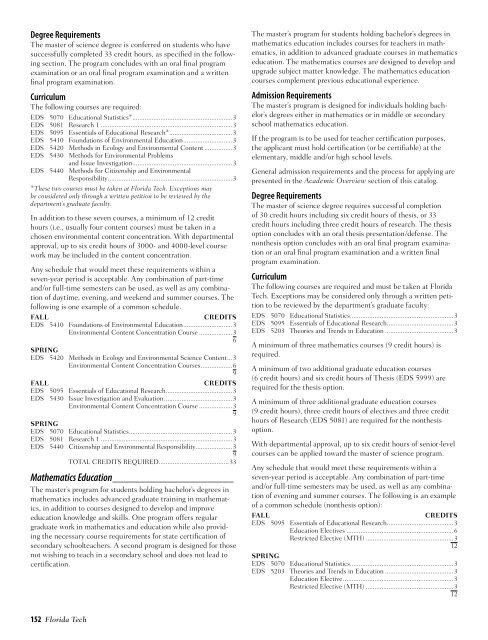2008–2009 - Florida Institute of Technology
2008–2009 - Florida Institute of Technology
2008–2009 - Florida Institute of Technology
Create successful ePaper yourself
Turn your PDF publications into a flip-book with our unique Google optimized e-Paper software.
Degree Requirements<br />
The master <strong>of</strong> science degree is conferred on students who have<br />
successfully completed 33 credit hours, as specified in the following<br />
section. The program concludes with an oral final program<br />
examination or an oral final program examination and a written<br />
final program examination.<br />
Curriculum<br />
The following courses are required:<br />
EDS 5070 Educational Statistics* .........................................................3<br />
EDS 5081 Research 1 ...........................................................................3<br />
EDS 5095 Essentials <strong>of</strong> Educational Research* ....................................3<br />
EDS 5410 Foundations <strong>of</strong> Environmental Education ............................3<br />
EDS 5420 Methods in Ecology and Environmental Content ................3<br />
EDS 5430 Methods for Environmental Problems<br />
and Issue Investigation .........................................................3<br />
EDS 5440 Methods for Citizenship and Environmental<br />
Responsibility .......................................................................3<br />
*These two courses must be taken at <strong>Florida</strong> Tech. Exceptions may<br />
be considered only through a written petition to be reviewed by the<br />
department’s graduate faculty.<br />
In addition to these seven courses, a minimum <strong>of</strong> 12 credit<br />
hours (i.e., usually four content courses) must be taken in a<br />
chosen environmental content concentration. With departmental<br />
approval, up to six credit hours <strong>of</strong> 3000- and 4000-level course<br />
work may be included in the content concentration.<br />
Any schedule that would meet these requirements within a<br />
seven-year period is acceptable. Any combination <strong>of</strong> part-time<br />
and/or full-time semesters can be used, as well as any combination<br />
<strong>of</strong> daytime, evening, and weekend and summer courses. The<br />
following is one example <strong>of</strong> a common schedule.<br />
FALL CREDITS<br />
EDS 5410 Foundations <strong>of</strong> Environmental Education ............................3<br />
Environmental Content Concentration Course ...................3<br />
6<br />
SPRING<br />
EDS 5420 Methods in Ecology and Environmental Science Content ...3<br />
Environmental Content Concentration Courses ..................6<br />
9<br />
FALL CREDITS<br />
EDS 5095 Essentials <strong>of</strong> Educational Research ......................................3<br />
EDS 5430 Issue Investigation and Evaluation .......................................3<br />
Environmental Content Concentration Course ...................3<br />
9<br />
SPRING<br />
EDS 5070 Educational Statistics ...........................................................3<br />
EDS 5081 Research 1 ...........................................................................3<br />
EDS 5440 Citizenship and Environmental Responsibility .....................3<br />
9<br />
TOTAL CREDITS REQUIRED ........................................33<br />
Mathematics Education ______________________<br />
The master’s program for students holding bachelor’s degrees in<br />
mathematics includes advanced graduate training in mathematics,<br />
in addition to courses designed to develop and improve<br />
education knowledge and skills. One program <strong>of</strong>fers regular<br />
graduate work in mathematics and education while also providing<br />
the necessary course requirements for state certification <strong>of</strong><br />
secondary schoolteachers. A second program is designed for those<br />
not wishing to teach in a secondary school and does not lead to<br />
certification.<br />
152 <strong>Florida</strong> Tech<br />
The master’s program for students holding bachelor’s degrees in<br />
mathematics education includes courses for teachers in mathematics,<br />
in addition to advanced graduate courses in mathematics<br />
education. The mathematics courses are designed to develop and<br />
upgrade subject matter knowledge. The mathematics education<br />
courses complement previous educational experience.<br />
Admission Requirements<br />
The master’s program is designed for individuals holding bachelor’s<br />
degrees either in mathematics or in middle or secondary<br />
school mathematics education.<br />
If the program is to be used for teacher certification purposes,<br />
the applicant must hold certification (or be certifiable) at the<br />
elementary, middle and/or high school levels.<br />
General admission requirements and the process for applying are<br />
presented in the Academic Overview section <strong>of</strong> this catalog.<br />
Degree Requirements<br />
The master <strong>of</strong> science degree requires successful completion<br />
<strong>of</strong> 30 credit hours including six credit hours <strong>of</strong> thesis, or 33<br />
credit hours including three credit hours <strong>of</strong> research. The thesis<br />
option concludes with an oral thesis presentation/defense. The<br />
nonthesis option concludes with an oral final program examination<br />
or an oral final program examination and a written final<br />
program examination.<br />
Curriculum<br />
The following courses are required and must be taken at <strong>Florida</strong><br />
Tech. Exceptions may be considered only through a written petition<br />
to be reviewed by the department’s graduate faculty:<br />
EDS 5070 Educational Statistics ...........................................................3<br />
EDS 5095 Essentials <strong>of</strong> Educational Research ......................................3<br />
EDS 5203 Theories and Trends in Education .......................................3<br />
A minimum <strong>of</strong> three mathematics courses (9 credit hours) is<br />
required.<br />
A minimum <strong>of</strong> two additional graduate education courses<br />
(6 credit hours) and six credit hours <strong>of</strong> Thesis (EDS 5999) are<br />
required for the thesis option.<br />
A minimum <strong>of</strong> three additional graduate education courses<br />
(9 credit hours), three credit hours <strong>of</strong> electives and three credit<br />
hours <strong>of</strong> Research (EDS 5081) are required for the nonthesis<br />
option.<br />
With departmental approval, up to six credit hours <strong>of</strong> senior-level<br />
courses can be applied toward the master <strong>of</strong> science program.<br />
Any schedule that would meet these requirements within a<br />
seven-year period is acceptable. Any combination <strong>of</strong> part-time<br />
and/or full-time semesters may be used, as well as any combination<br />
<strong>of</strong> evening and summer courses. The following is an example<br />
<strong>of</strong> a common schedule (nonthesis option):<br />
FALL CREDITS<br />
EDS 5095 Essentials <strong>of</strong> Educational Research ......................................3<br />
Education Electives .............................................................6<br />
Restricted Elective (MTH) ..................................................3<br />
12<br />
SPRING<br />
EDS 5070 Educational Statistics ...........................................................3<br />
EDS 5203 Theories and Trends in Education .......................................3<br />
Education Elective ...............................................................3<br />
Restricted Elective (MTH) ..................................................3<br />
12

















